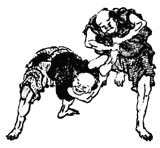 |
|
|
|
|
Good question. Whose aikido IS best? Many students are looking for the most authentic representation of the art. Which senior instructor's style is closest to the founder of aikido? Who spent the most amount of time as a real uchideshi to Morihei Ueshiba Sensei? Who really spent most of their time learning from senior teachers and only saw the old sensei on occasion? Who inherited his legacy? Instructors often use these topics as criteria for judging who has the most power and authority. An important question we should ask is - Was the founder's aikido the best or most evolved form that aikidoka should strive for? | |
|
|
||
 |
Many aikido students around the world have developed a form of "hero workship" and idealization which makes them feel more comfortable because "they are now part of that power, authority, and lineage ... and if they do what they're told ... they, also, will have this power and authority." I think the founder realized this and is known to have said, (as translated by John Stevens) "You can't do MY aikido, you must find your own." He also said, "...absorb venerable traditions into this new art by clothing them with fresh garments, and build on the classic styles to create better forms." Many aikido students have said that this creating stopped with the founder and that he had created the ultimate form. I don't agree; and in fact, think the founder would not agree. Probably with some sadness that so many haven't heard and understood. Let's assume we do have a good system we want to pass on. There is a lineage, proud and well defined, in place. We now assume that this knowledge can be transmitted and passed down in the same form. We can't know for sure if the techniques being done by the person who is currently the "holder of the power" are the same. In fact, we must accept that they are not! |
|
| Differences in stature, understanding, and intent of each aikidoka assure us that the techniques must be different. However, principle and a specific method or system of teaching the principles can be passed down in similar form as it was in the past. Unlike music, which has a written language that informs us how to play a piece of music extremely close to the way it was two hundred years ago, aikido has no written language or notation system to communicate it's form and expression. Many instructors teach their own idiosyncratic style as the best expression of aikido principle because it is the best way THEY can do it. | ||
 |
In order to keep these differences from diluting the art over the generations, we must make use of a systematic way to teach principle that allows individual students to use the form (techniques) to develop their own "style" of aikido that does express the principle in the best way possible. It's important to remember that principle does not change, form can change, and of course individuals should eventually evolve their own style. In order to really express Universal Principle, we must create that expression out of our own creative spirit each instant. Otherwise, it is just a copy. As we can all tell when we see it, the copy is quite dull when compared to the real thing! |
|
|
|
||
 |
After a long search, you have found a system that you have decided contains the physical fundamentals, the educational principles, and the spiritual qualities you are looking for. On top of that, you are fortunate to have found a teacher that you feel you trust and can learn from. Then this must be the best for you. We must understand that this doesn't mean that it is the best for everyone! Once we find our teacher and have established a relationship, we must keep our hearts and spirits open. If we continue in the practice we will, at some point, begin to create the real expression of aikido and develop our own authority. The teacher's intent should be to help you (as a guide) to learn how to practice and how to learn. If successful, some of the students will eventually learn more than the teacher. Thus, the art is not only preserved, but is a living, growing entity filled with the spirit of those who have passed as well as those who are practicing now. So ... who really does have the best aikido?
I believe that each person who is truly demonstrating correct principle and creating the best expression of their own aikido technique each instant is doing their own "best aikido". Who does THE BEST aikido is a question that can never be answered to everyone's satisfaction. JUST PRACTICE! |